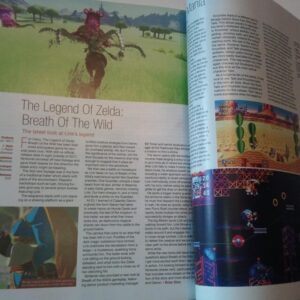Communication of the ACM Magazine NM 8/2019 Vol 62 # 8 Making Robot Likeable
$39.99
Description
Communication of the ACM Magazine NM 8/2019 Vol 62 # 8 Making Robot Likeable
Communications of the ACM is the monthly journal of the Association for Computing Machinery. It was established in 1958, with Saul Rosen as its first managing editor. It is sent to all ACM members. Articles are intended for readers with backgrounds in all areas of computer science and information systems.
EDITORIAL
Dispelling common myths about ACM awards and honors
EDITORIAL
Undo, redo, and regrets
OPINION
A case against mission-critical applications of machine learning
RESEARCH-ARTICLE
Cutting the wait for CS advice
The Communications Web site, http://cacm.acm.org, features more than a dozen bloggers in the BLOG@CACM community. In each issue of Communications, we’ll publish selected posts or excerpts.
RESEARCH-ARTICLE
The algorithm that changed quantum machine learning
A college student discovered a classical computing algorithm that experts overlooked. It promises to change both classical and quantum machine learning.
RESEARCH-ARTICLE
I don’t understand my car
Self-driving cars will need good communication skills.
RESEARCH-ARTICLE
What makes a robot likable?
Interactions with robotics teach us more about people.
OPINION
Block-based programming in computer science education
Considering how block-based programming environments and tools might be used at the introductory level and beyond.
COLUMN: Economic and business dimensions
OPINION
A response to fake news as a response to Citizens United
How boundaries on speech could free the market for speech.
COLUMN: Kode vicious
OPINION
MUST and MUST NOT
On writing documentation.
OPINION
The success of the web: a triumph of the amateurs
Connecting the unique factors that influenced the origination and subsequent development of the World Wide Web.
RESEARCH-ARTICLE
Industry-scale knowledge graphs: lessons and challenges
Five diverse technology companies show how it’s done.
RESEARCH-ARTICLE
Research for practice: the DevOps phenomenon
An executive crash course.
RESEARCH-ARTICLE
Overly attached
Know when to let go of emotional attachment to your work.
RESEARCH-ARTICLE
Embedded EthiCS: integrating ethics across CS education
A Harvard-based pilot program integrates class sessions on ethical reasoning into courses throughout its computer science curriculum.
RESEARCH-ARTICLE
Scaling static analyses at Facebook
Key lessons for designing static analyses tools deployed to find bugs in hundreds of millions of lines of code.
REVIEW-ARTICLE
Activity-centric computing systems
The ability to build a construct that organizes work from different devices and information resources is as complex as it is invaluable.
REVIEW-ARTICLE
The history of digital spam
Tracing the tangled web of unsolicited and undesired email and possible strategies for its demise.
SECTION: Research highlights
OTHER
Technical perspective: The true cost of popularity
RESEARCH-ARTICLE
Heavy hitters via cluster-preserving clustering
We develop a new algorithm for the turnstile heavy hitters problem in general turnstile streams, the EXPANDERSKETCH, which finds the approximate top-k items in a universe of size n using the same asymptotic O(k log n) words of memory and O(log n) update …
RESEARCH-ARTICLE
Fluid democracy
From the intersection of computational science and technological speculation, with boundaries limited only by our ability to imagine what could be.
In trying to “drown” the opposition with daily online elections, I didn’t realize they could wash me away.
Subjects
Activity centered design
Codes of ethics
Collaborative content creation
Computer science education
Computing education
Human-centered computing
Program reasoning
Software development methods
Software functional properties
Software verification.
Address label on cover. Otherwise in unread condition. More pictures may be in description (which it is suggested you read!)
Related products
-

Game Informer 189 NM Uncharted 2 Cvr Dead Space Metallica Left 4 Dead
$29.99 Add to cart -


Game Informer 323 NM Outriders Cvr Pokemon Sword Shield Mythic Quest Earthbound
$29.99 Add to cart -


Game Informer 286 NM Top 50 Games 2016 Sonic Mania Super Mario Run Last Guardian
$29.99 Add to cart -


Game Informer 322 NM Magic Legends Cv Journey to the Savage Planet Resident Evil
$29.99 Add to cart


